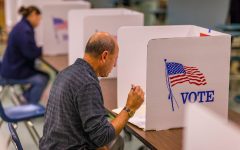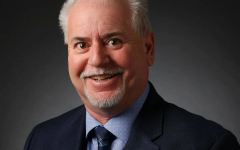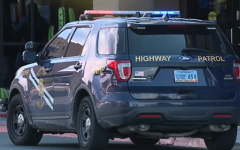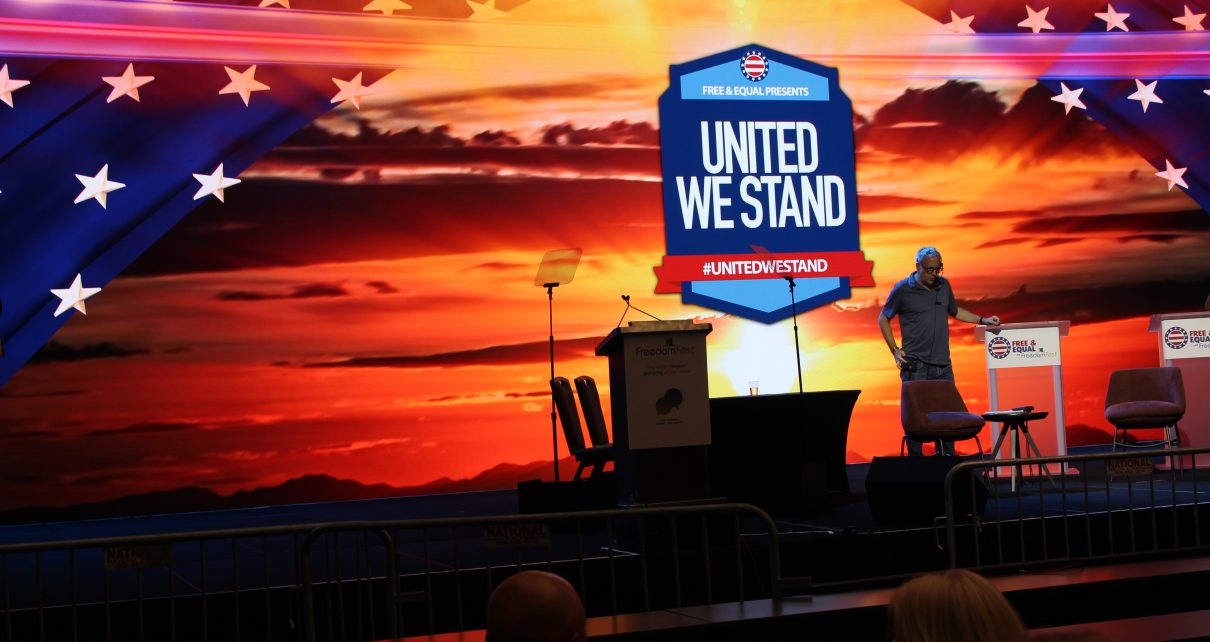
Freedom Fest 2024 (Photo: TNG staff)
Freedom is Disagreement: Recap of FreedomFest ’24
Variety of opinion flourishes in a country that is politically divided
By TheNevadaGlobeStaff, August 4, 2024 2:05 pm
The United States of America has historically been associated with the ideal of freedom. But in recent years, the popularity of freedom seems to be declining. Freedom of speech, we are told, is “dangerous” because it leads to “disinformation.” Many people disagree, yet they are concerned about political polarization. People might be free to speak their minds, but they risk losing friends, alienating relatives, damaging their own careers, and, sometimes, inviting danger into their lives.
Must political disagreement be inevitably accompanied by conflict, chaos, and civil war? Must this be the fate of freedom in America?
What we saw at FreedomFest in Las Vegas this year suggests that, no, it mustn’t.
Now in its 17th year, FreedomFest is a conference dedicated to many issues, but is focused on celebrating and promoting individual liberty. The show is popular with libertarians and libertarian-leaning conservatives, but the multi-day event is officially nonpartisan and does a good job involving speakers who are, or have been, associated with the political left.
Among this year’s speakers were Bret Weinstein, Michael Shellenberger, Cornel West, and Robert F. Kennedy Jr., the latter two of whom are running for president as independents. They joined, and sometimes shared the stage with, other speakers of a more rightward bend, including Justin Amash, Kash Patel, Kentucky Congressman Thomas Massie, and Nevada Governor Joe Lombardo.
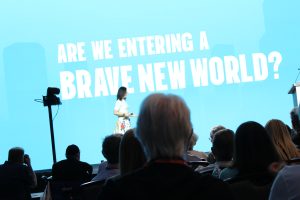
In today’s political climate, the assembly of differently-minded people should result in blows or some amount of yelling, but over the course of four days (July 10-13) inside the Caesars Forum near the Las Vegas Strip, hundreds of speakers and thousands of attendees peaceably discussed several hot-button issues, including the former presidency and current candidacy of Donald Trump.
Several speakers did speak favorably of Trump, especially when the economy came up, and some speakers, such as Kash Patel, have worked for the Trump administration. But this was no MAGA event. Other speakers, such as former (and aspiring) Congressman Justin Amash, have been critical of the former president, and with the amount of pro-Kennedy people in attendance, one could not take it for granted that Trump was everyone’s preferred candidate. One negative opinion of the former president came from actor and musician Ice-T who, while speaking onstage, called Trump a “con man.” “I know a criminal when I see one,” he added. It was unlikely to have gratified everyone in the audience, but there was no jeering or booing—nor, for that matter, any cheering or clapping.
Neither was there any jeering or booing (although The Globe did talk to one person who was annoyed enough to walk out) when renowned academic Steven Pinker delivered a lecture emphasizing that people would do well to put their natural reservations aside and simply trust science, vaccines, and institutions—a risky sell at a show where the dominant theme is the power of the individual over the establishment. Dr. Pinker’s comments were counterbalanced by speakers such as Del Bigtree of the Informed Consent Action Network (ICAN) who argued passionately and dynamically against vaccine mandates.
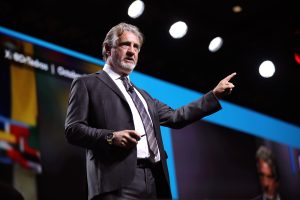
(Attribution: Gage Skidmore)
The disagreements and the swings in perspective continued.
Longtime gun rights advocate John Lott tried to demonstrate that attempts to undermine and reform the police in recent years have made communities less safe, and that the key to reversing that was stronger policing. The next day, marketing executive Austin Berg asserted that “our criminal justice system is one of the biggest barriers to human potential that we have in our country.” He implored the audience to consider that “incarceration is a government program, and as a government program, it is horribly inefficient and not great at its job.” Even the idea of regulation, which might seem anathematic at a libertarian conference, was promoted by evolutionary biologist Bret Weinstein who argued that liberty needed to be paired with smart and moral regulation that could increase liberty and mitigate dysfunction.
Short of “freedom is bad,” practically every kind of viewpoint was present at the conference. The attendees didn’t simply tolerate the disagreements, they welcomed and cherished them.
During a talk about election integrity, Las Vegas author and conservative activist Chuck Muth provided an update to the ongoing, grassroots efforts to clean up the voter rolls. Governor Lombardo kicked off the event with a keynote speech highlighting the pro-freedom record of his administration.
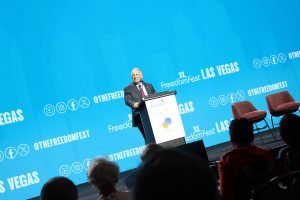
Robert F. Kennedy Jr.’s highly anticipated speech was not so much an ode to disagreements, but a call to work together despite them. The issues facing the country are serious, he said, and fixing them will require cooperation from many different kinds of people. But neither the Democratic or Republican Party can be counted on to be very useful, because once elected, each party is too focused on rewarding itself and punishing the other. The solution Kennedy proposed is a “unity government” made up of Democrats, Republicans, libertarians, and people from other parties. He called this vision “America Strong,” inspired by the likes of Boston Strong, Houston Strong, and even Vegas Strong—times when crises forced people to put their differences aside and work together. The crisis facing our nation is a “crisis of division,” he said, concluding that the remedy should be a “unity government,” and the ideal that should bind people together, despite disagreements, should be “the ideal of freedom,” which is central and essential to the identity of the nation.
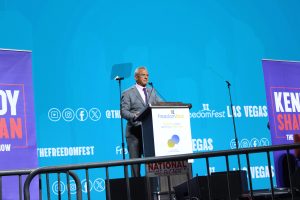
The next day on June 13, while campaigning in Butler, Pennsylvania, President Trump survived a failed assassination attempt. The news spread quickly throughout the conference. In what was perhaps the first great act of unanimity at the show, everyone appeared to agree that this was awful and shouldn’t have happened. The assassination attempt highlighted how dangerous our political environment has become. One man, Corey Comperatore, lost his life at the Trump rally, and others were critically injured. It was a chilling and depressing event in our nation’s history, but the immediate reaction to it was encouraging.
President Biden addressed the nation later that day and called on everyone to “lower the temperature.” Speaking at the RNC Convention, Trump remarked, “Now is the time to remember that we are all fellow citizens. We are one nation under God, indivisible, with liberty and justice for all.”
At FreedomFest, we routinely asked speakers to weigh in on whether there is widespread appetite for freedom in America, and the responses we received were overwhelmingly positive. We learned that disagreement does not have to mean division, and that people with very different points of view can be united by a passion for freedom and respect for one another.
Thankfully, Trump survived. Judging by the passion, respect, and optimism that we saw at FreedomFest this year, we think that freedom has a good chance of doing the same.
- Vegas Detectives Seek Leads After Man’s Blunt Force Death in Busy Corridor - February 16, 2026
- Rubio in Munich: The West Must Step Up or Fall Behind - February 16, 2026
- Security Without Paychecks: How the DHS Shutdown Is Impacting Las Vegas Travelers - February 16, 2026


